
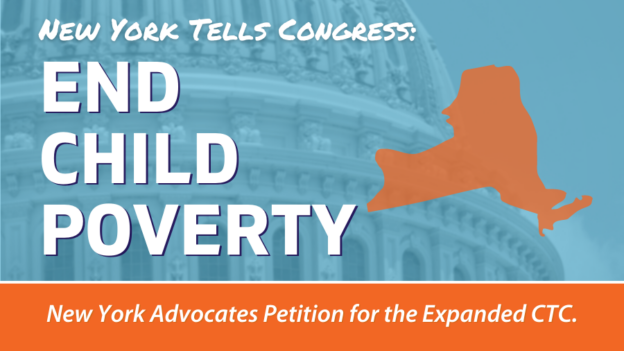
New York Advocates for the Expanded Child Tax Credit



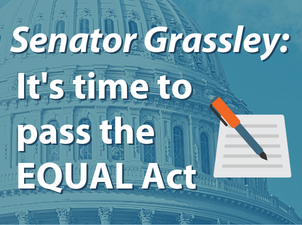

The Senate recently joined the house in passing the FY2023 National Defense Authorization Act (NDAA). Unfortunately, the final NDAA legislation failed to include the EQUAL Act (S.79/H.R.1693); a key NETWORK priority we had hoped would be included and passed as a part of that larger bill.
With bipartisan and bicameral support, NETWORK strongly supports the EQUAL Act’s much needed reforms to eliminate the disparity in sentencing for cocaine offenses, a major contributor to mass incarceration. Local Op-eds and even the New York Times Editorial Board are also calling for Senator Grassley and Congress to pass this legislation to ”finally dismantle the nation’s failed war on drugs.”
There is still time for Congress to pass the EQUAL Act, but it has to happen before the end of the year. Now is the time for Congress to act, uplifting human dignity by ensuring sentencing equity in our nation.
Winning Iowa Senator Chuck Grassley’s support for the EQUAL Act is key to securing its passage, because of his position as ranking member of the Senate Judiciary Committee. Therefore, after the Senate failed to pass the EQUAL Act via the NDAA, NETWORK delivered a letter to Senator Grassley signed by nearly 130 Iowans, including 45 Catholic Sisters, expressing strong support for the EQUAL Act. The letter urges Senator Grassley and the Senate to pass this critical bill and other criminal justice reforms before the end of this year:
“As people of faith, we cannot continue to tolerate racial profiling, police brutality, the loss of future generations to mass incarceration, or the perpetuation of poverty. We affirm the truth that every person is entitled to dignity and equitable justice under law.”
Help us spread the word about this important and urgent legislation and urge Senator Grassley to support the EQUAL Act!
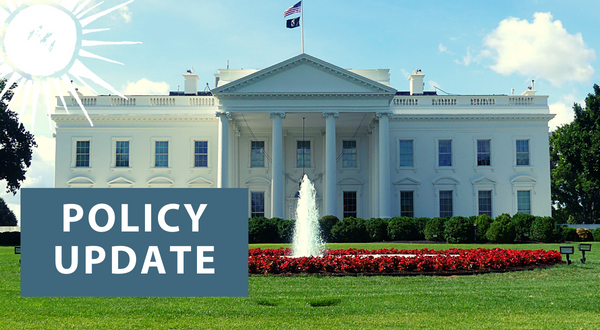

For immigrants from countries beset by violence, natural disasters and other turmoil, TPS provides protection from deportation and other benefits–at least temporarily. The Department of Homeland Security (DHS) estimates that over 504,170 immigrants from 15 countries have or are eligible for TPS in the U.S. The program has been much in the news lately and, in recent weeks, the news has been good.
DHS grants TPS to immigrants in the U.S. from countries that it identifies as unsafe due to political unrest, natural disasters, and other hazardous conditions. Immigrants with TPS can remain in the U.S. temporarily without fear of deportation and can work and travel regardless of their immigration status, even if they were otherwise here without lawful authorization. Typically, DHS grants TPS for 18-month periods that are often extended, and it applies it to immigrants already in the U.S. at the time of their home country’s TPS designation. TPS is not a direct path to permanent residency or citizenship, but it temporarily provides solid protection from deportation and a means of employment for hundreds of thousands of TPS recipients.
On December 5, DHS announced the TPS re-designation of Haiti, a country struggling with government upheaval, widespread gang violence, the aftermath of hurricanes and earthquakes and, now, a cholera outbreak. The TPS status of approximately 100,000 Haitian immigrants who arrived in the U.S. in recent years was scheduled to expire on February 3, 2022 unless the Biden Administration took action. With the new re-designation, Haitian nationals who arrived in the U.S. by November 6, 2022 will be eligible for TPS through August 3, 2024.
The Biden Administration’s expansion of the use of TPS was especially welcome, and a departure from Trump Administration efforts to dismantle the program (which were impeded by court action). The Biden Administration tried to legislate permanent protections for TPS recipients, but that failed when Republican Senators refused to consider immigration reform.
The Biden Administration has extended prior TPS protections for immigrants from South Sudan, Sudan, and Syria. It also added eight new countries—and more than 175,000 newly eligible immigrants–to the TPS list, including Venezuela, Myanmar, Somalia, and Yemen in 2021, and Afghanistan, Cameroon, Ukraine, and Ethiopia earlier in 2022.
On October 25, a threat to long-standing protections for TPS holders from El Salvador, Honduras, Nicaragua, and Nepal abruptly surfaced, resulting from the revival of a 2018 court challenge to Trump Administration efforts to dismantle TPS. While immigration advocates initially succeeded in federal district court, the Ninth Circuit Court of Appeals overturned that decision and held that Trump’s actions were lawful. When the Biden Administration took over in 2021, the parties entered into many months of settlement negotiations that stayed further court action. But those talks broke down in late October with no settlement, leaving the future of nearly 370,000 immigrants whose TPS was scheduled to terminate on December 31, 2022 at serious risk.
On November 11, that crisis was averted when DHS announced an 18-month extension—to June 31, 2024 for existing TPS recipients from El Salvador, Honduras, Nicaragua, and Nepal who were subject to the December 31 deadline. This extension was an act of simple humanity, especially since most of the individuals caught up in the court case have been in the United States for decades. NETWORK joined with the TPS-DED Administrative Advocacy Coalition, a coalition of over 100 representatives of faith-based and secular organizations, in urging the Administration to take quick action to announce a prompt TPS extension. (https://static1.squarespace.com/static/60b79f3630f94f1039bd0125/t/635a9dde506660168de54139/1666883038701/2022-10-27+Press+Release+re+Ramos+Settlement.pdf). To the great relief of the faith community and all people of good will, that call was answered.
At this time, more than 500,000 immigrants in the U.S. are secure in their TPS protection, but TPS remains only a temporary benefit, and any future extensions or expansions of the program will be decided by whoever is in the White House. NETWORK will monitor future developments in the TPS program and continue to advocate for TPS holders and all of our immigrant neighbors.
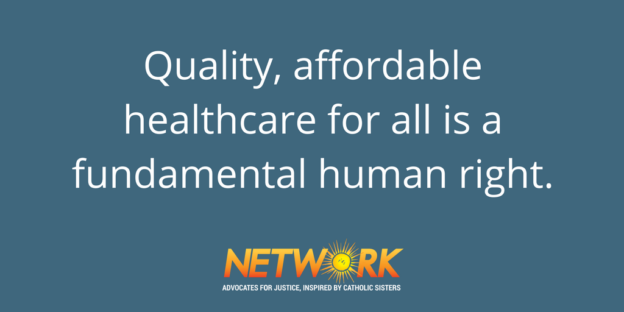

Dear Member of Congress,
The undersigned organizations from the Washington Interreligious Staff Community (WISC) Health Care Working Group write to urge you to advance an end-of-year funding package that prioritizes health care for vulnerable communities. We are grateful for significant healthcare advancements made since the beginning of the 117th Congress to expand healthcare and create greater health equity, and we believe Congress must take further action to better protect the health and economic security of vulnerable populations.
Guided by the belief that healthcare is a fundamental human right, our organizations work each day to protect existing domestic healthcare programs and increase access to quality, affordable, and equitable health care. Our diverse faith traditions compel us to protect the most vulnerable among us – including individuals in rural areas, low-income people, People of Color, Indigenous people, immigrants, people with disabilities and chronic illnesses, and seniors and children. Many populations, including those listed above, face unique barriers to obtaining comprehensive care and continue to experience significant healthcare disparities.
We urge Congress to pass an end-of-year funding package that includes the following provisions:
Over the past three years, the uninsured rate in the United States has reached a record low and
Medicaid and CHIP enrollment has increased, in part due to continuous coverage requirements implemented under the COVID-19 public health emergency. Given that the public health emergency will likely expire in the coming months, however, these continuous coverage requirements will also cease. Between 5 and 14 million people are expected to lose coverage, and people with disabilities, individuals with limited English proficiency, and those who moved since the pandemic began are at the greatest risk.
Because each state manages Medicaid and CHIP programs within federal guidelines, there is
tremendous variation in the scope of services available across the United States. Congress must heed the lessons of recent years and guarantee 12 months of continuous eligibility for adults and children through Medicaid and CHIP to avoid large scale disruption of coverage. Continuous eligibility for children and adults in Medicaid and CHIP ensures that people will remain eligible for Medicaid coverage or for CHIP for a one-year period, regardless of changes in their family’s income. While all vulnerable populations would benefit from this action, there are long-term benefits for children as those with health coverage are more likely to show improved health, lower rates of disability, and greater financial security in adulthood. By guaranteeing continuous Medicaid or CHIP eligibility in every state, Congress can advance health equity by promoting continuity of treatment for low-income individuals who
experience disproportionate rates of health disparities.
Providing continuous Medicaid coverage for one year postpartum is critical to improving maternal and child health outcomes. While Medicaid finances roughly 40 percent of births in the United States, including 59 percent of births to Hispanic mothers and 65 percent of births to Black mothers, federal law only requires states to continue covering these mothers for 60 days postpartum. One-third of pregnancy-related deaths occur postpartum, including almost 12 percent that occur in the late postpartum period (between 43 and 365 days postpartum). Even as the American Rescue Plan Act allowed states to extend coverage via a state plan amendment, only half of states have or are planning to do so. Yet the need for postpartum medical care does not end after two months; in fact, over 70 percent of postpartum spending occurs between three and twelve months after delivery, as continuous postpartum care is critical for detecting postpartum depression, birth-related complications, and other
chronic conditions. Congress must provide 12 months of postpartum coverage to ensure that mothers can continue accessing life-saving care beyond 60 days.
Due to limitations in the funding statute, Medicaid programs in the territories operate differently than Medicaid programs in the states. First, although federal funding covers a specified share of each state’s Medicaid spending, the territories receive federal funding via temporary fixed block grants that are inadequate to meet their needs. Second, while the federal medical assistance percentage (FMAP) in the states is tied to per capita income, the FMAP in the territories is fixed at artificially low levels, even as per capita income is lower than the poorest states.
As a result of these unequal funding structures, the territories face a looming Medicaid cliff, and even recent improvements to the territories’ Medicaid programs are in jeopardy. While a recent Centers for Medicare and Medicaid Services interpretation determined that future allotments in Puerto Rico (which is still recovering from Hurricane Fiona) should increase from $400 million to $3 billion, Congress is facing pressure to reverse that interpretation, which would cause the 2023 allotment to plummet. Similarly, although the 2022 Consolidated Appropriations Act temporarily increased the FMAP from 55 percent to 76 percent for Puerto Rico and 83 percent for Guam, the U.S. Virgin Islands, the Northern Mariana Islands, and American Samoa, the FMAPs will revert to 55 percent on December 16 absent Congressional action. Given that most residents in the territories are People of Color, this is a racial
justice issue.
Congress must act swiftly to avert the funding cliff. Most urgently, Congress should maintain the CMS interpretation on Puerto Rico, increase the block grant allotments for all territories, and maintain or increase the federal matching rates to align with the states. In the long term, Congress must reform the funding structure for the territories’ Medicaid programs to ensure they can operate at parity with state Medicaid programs.
Congress must also take bold action to address the maternal health crisis that disproportionately affects Communities of Color. Black mothers in the United States three to four times more likely to die from pregnancy-related complications than white women, while Hispanic, Native American, and Asian American and Pacific Islander people experience disproportionate mortality and morbidity rates as well. To address these disparities, Congress must include the Black Maternal Health Momnibus Act (S.346/H.R.959) in end of the year legislation. This package invests in social determinants of health, funds community-based organizations seeking to improve maternal health outcomes, and expands and diversifies the perinatal workforce.
While the United States has made significant progress since the beginning of COVID-19, the virus poses an ongoing danger to the country. Each day, the United States still experiences hundreds of deaths and thousands of new hospitalizations and reported cases. Long COVID remains a significant threat, already affecting 16 million U.S. adults and has forcing up to 4 million people out of the workforce. As public health protections fade and individual protective measures prove insufficient, the sustained spread places everyone (especially people with disabilities, immunocompromised people, and the elderly) at significant risk.
Continued harm from COVID-19 is not inevitable, and Congress must act swiftly to increase COVID-19 funding. The federal government has already begun to run out of money to continue its pandemic response, resulting in a dramatic contraction in free rapid tests, personal protective equipment, and treatments. The lack of funding has also limited the federal government’s ability to raise awareness about bivalent boosters, monitor cases, and conduct research into new vaccines and treatments.
Three years into the pandemic, we cannot accept this devastation as our new normal. As the United States faces a projected winter surge, and as pediatric emergency rooms and intensive care units become overrun due to RSV and flu, Congress must act quickly to mitigate COVID-19 and ensure that hospitals remain functional. We urge Congress to provide robust funding and partner with federal, state, and local officials to confront the ongoing pandemic.
Health inequities in the United States are the result of a long history of systemic racism, ableism, classism, and other forms of oppression. All our faiths call us to end these stark divides and ensure that everyone has access to quality, affordable, and equitable medical care. Congress must work to promote continuous and expanded Medicaid coverage, increase Medicaid funding to the territories, address the Black maternal health crisis, and increase COVID-19 funding, we will fail to eliminate the inequities that have plagued the United States for far too long. We urge you to support a year-end funding package that advances these priorities.
Sincerely,
Alliance of Baptists
American Muslim Health Professionals
Bread for the World
Church and Society Team, Tennessee-Western Kentucky Conference of the United Methodist Church
Church World Service
Congregation of Our Lady of Charity of the Good Shepherd, U.S. Provinces
Friends Committee on National Legislation
National Advocacy Center of the Sisters of the Good Shepherd
National Council of Jewish Women
National Latino Evangelical Coalition
Network Lobby for Catholic Social Justice
Sisters of Mercy of the Americas Justice Team
Sojourners
The Episcopal Church
The Presbyterian Church (USA): Washington Office of Public Witness & Presbyterian Ministry at the United Nations
The United Methodist Church – General Board of Church and Society
Union for Reform Judaism
Unitarian Universalists for Social Justice
United Church of Christ
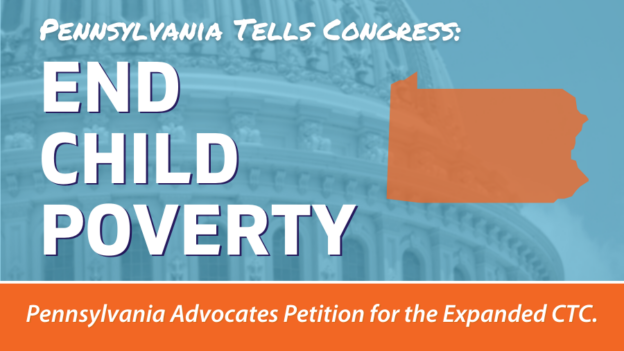

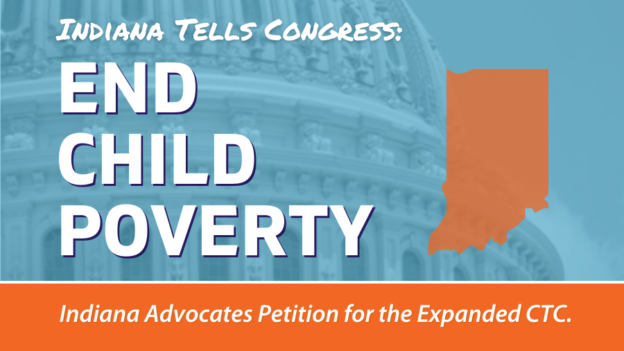



 Over the past two years, the NETWORK community has worked to advance legislation that would reform the criminal legal system for our first and second annual Lobby Days, with the goal of doing our part to end the injustice of mass incarceration.
Over the past two years, the NETWORK community has worked to advance legislation that would reform the criminal legal system for our first and second annual Lobby Days, with the goal of doing our part to end the injustice of mass incarceration.
Now, after much effort, the Eliminating a Quantifiably Unjust Application of the Law, better known as the EQUAL Act, finally has an opportunity to pass in the Senate. The EQUAL Act is bipartisan legislation that seeks to eliminate the disparity in sentencing for cocaine offenses, a major contributor to mass incarceration. It would apply retroactively to those already convicted or sentenced. The difference between success and failure is dependent on NETWORK and our partners making a joyful noise in support of the EQUAL Act.
The original EQUAL Act was introduced in the House on March 9, 2021 by Representatives Hakeem Jeffries, Kelly Armstrong, Bobby Scott, and Don Bacon and in the Senate on January 28, 2021 by Senators Cory Booker and Dick Durbin. The House passed the bill on September 28, 2021. However, the Senate Judiciary Committee failed to take it up for consideration. The lead Senate sponsors were not satisfied with the bill dying in Committee, so they and Rep. Jeffries inserted the EQUAL Act into a piece of must-pass legislation, the National Defense Authorization Act (NDAA).
Now, categorically, NETWORK does not support the NDAA. Congress passes the NDAA every year to set guidelines and priorities for defense policy, make organizational changes to the Department of Defense (DoD) and other interrelated agencies, and provide guidance on how military funding can be spent among other things. Year after year, mandatory military funding has proven that exponentially increased military spending has been detrimental to our nation, and its passage has often been the bane of justice advocates and peace seekers nationwide. Instead of Congress pursuing bold reforms to defense spending, the annual passage of ever-increasing funding to the DoD in the NDAA has locked us in an unsustainable cycle that leaves other legislative priorities without adequate financial support, and left only crumbs for disenfranchised and disinvested communities of color.
Despite our disagreements with it, the NDAA will pass with broad bipartisan support this year, as it does every year. At this point, as we near the end of the 117th Congress, it is also the only bill that can carry the EQUAL Act over the finish line.
In the pursuit of justice, we applauded the House sponsors of the EQUAL Act for adding its provisions into this year’s NDAA in an attempt to secure its passage. Unfortunately, Senator Chuck Grassley—the ranking Republican member of the Senate’s Judiciary Committee—has maintained his disapproval of the EQUAL Act by thwarting its advancement to the Senate floor. In fact, he has submitted his own, less than equitable and considerably problematic alternative into the NDAA among other amendments counterproductive to eliminating injustice and racial disparity.
Senator Grassley has a history of supporting criminal legal system reforms. In the late 1990s, he launched a successful statewide initiative to address Iowa’s drug addiction problems at the grassroots community level. Now is the time to tell Senator Grassley that we need to accept the evidence-based need for the EQUAL Act to be passed, now, together. We need this racially equitable bill and nothing short of it.
While there are many provisions within the justice system that produce discriminatory and racist impacts, the crack/powder sentencing laws are among the most obvious. For many years now, science and experience have shown us there is no difference between use of crack or powder cocaine. Neither one is more or less addictive, nor produces more violent behavior in the user. The difference is that crack cocaine has historically been used in more urban communities of color, specifically Black communities, while powder cocaine has more often been found in whiter, more suburban communities. The racial implications couldn’t be clearer. Furthermore, the sentencing disparity between these two drugs has contributed significantly to the growth of mass incarceration in this country. According to FAMM, in 2019 alone, 81% of those convicted of crack cocaine offenses were Black, even though historically, 66% of crack cocaine users have been white or Hispanic. It is time to end this racist policy and restore proportionality in sentencing.
As people of faith, we cannot continue to tolerate racial profiling, brutality and hyper-militarization in policing, the loss of future generations to mass incarceration, or the perpetuation of poverty. We affirm the truth that every person is entitled to dignity and equitable justice under law. As the 117th Congress comes to a close after two years of hard-fought progress and arduous midterm elections, this one-of-a-kind legislation is much needed in order for our nation to be as liberatory and equitable as it is on paper. Now is the time for the Senate to follow the House in taking a firm stance against racism embedded within the criminal legal system by assuring the EQUAL Act is kept in the Senate’s FY 2023 National Defense Authorization Act.
If you live in Iowa, Add Your Name: Tell Senator Grassley to Support Fixing Racist Sentencing Disparities!
*If you know more Iowans to share this letter with, email the letter to them or post on Twitter or Facebook.


Dear Senator Grassley,
Our faiths call us to show mercy and treat everyone equally. In that spirit, we Iowans express our strong support for keeping S.79/H.R.1693—the Eliminating a Quantifiably Unjust Application of the Law (EQUAL) Act in H.R. 7900—the FY 2023 National Defense Authorization Act (NDAA). In the pursuit of justice by any legislative means possible, we applaud the House’s effort to include the EQUAL Act in the FY2023 NDAA, which passed on July 14, 2022 with bipartisan support, and we strongly urge you and the Senate to do the same.
The EQUAL Act has gained significant bipartisan support in the Senate as of April 4, 2022, with eleven Republican cosponsors and ten Democratic cosponsors. We applaud these Senators for supporting needed reforms that will eliminate the disparity in sentencing for cocaine offenses, a major contributor to mass incarceration, and urge you to join them in supporting the EQUAL Act is kept in S.4543, the Senate version of the FY2022 National Defense Authorization Act.
While there is no pharmacological difference between crack and powder cocaine, the 1986 Anti-Drug Abuse Act set up a 100:1 ratio for sentencing. Although usage of crack among Black people was only slightly higher than usage among white people, it was stereotypically associated with the Black community, while powder cocaine was associated with white users. The cocaine sentencing disparity meant that a person possessing five grams of crack was sentenced to the same amount of time as someone possessing 500 grams of powder cocaine.
This disparity is one of the causes of overincarceration of Black people for non-violent drug offenses and is one of the great injustices of the failed ‘War on Drugs.’ In the federal criminal legal system, the average Black defendant convicted of a drug offense will serve nearly the same amount of time (58.7 months) as a white defendant would for a violent crime (61.7 months).
Following decades of work by advocates, Congress decreased the sentencing disparity from 100-to-1 to 18-to-1 through the 2010 passage of the Fair Sentencing Act. The EQUAL Act will finally right this wrong by bringing the ratio to 1:1. Upon passage of the EQUAL Act, any person who has not yet been sentenced would be sentenced according to these guidelines, and anyone serving time under the previous guidelines would have the opportunity to request a review and resentencing of their case.
As people of faith, we cannot continue to tolerate racial profiling, police brutality, the loss of future generations to mass incarceration, or the perpetuation of poverty. We affirm the truth that every person is entitled to dignity and equitable justice under law. It is time for the Senate to follow the House in taking a firm stance against racism embedded within the criminal legal system by assuring the EQUAL Act is kept in the Senate’s FY 2023 National Defense Authorization Act.
**This letter is now closed, thank you for joining us.**
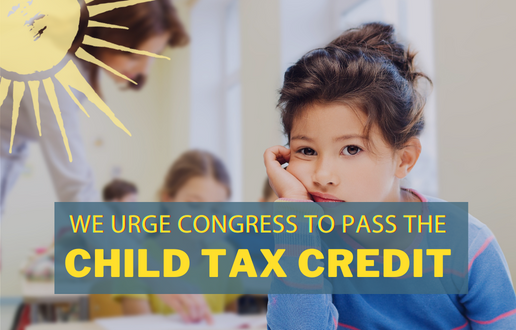

As the 117th Congress nears the end of its session, lawmakers are considering a short-term tax extender package to address expiring corporate tax breaks. NETWORK and our faith-based and secular partners believe it is poor policy, and morally repugnant, to extend tax breaks for well-heeled corporations without also enacting robust expansion of the Child Tax Credit (CTC). Congress must pass a fully refundable, monthly Child Tax Credit before the New Year.
Trickle-down policies favored by some politicians don’t work to provide low-income families the resources they need to live a dignified life. In fact, it leads to what Pope Francis has called the “idolatry of money” created by a culture of indifference to the excluded. Lawmakers have already proven that they can take action to substantially reduce child poverty and they must do again.
The American Rescue Plan (ARP) Child Tax Credit in December of 2021 lapsed in January 2022. The ARP Child Tax Credit significantly reduced child poverty to its lowest level ever. In the months since it ended, NETWORK and our partners have lobbied for legislation that reinstates a fully refundable, monthly Child Tax Credit. Child poverty, as measured by the supplemental poverty measure (SPM), declined to a historically low level of 5.2 percent in 2021—down from 9.7 percent in 2020—according to recently released data from the U.S. Census Bureau. This is powerful testimony to the effectiveness of the expanded Child Tax Credit.
The success of the 2021 expansion showed us that high child poverty rates are a policy choice, not an inevitability. In the congressional lame duck session, policymakers will have the opportunity once again to expand the Child Tax Credit, so that more families get help they need to afford the basics. ~ Center on Budget and Policy Priorities (CBPP)
Indeed, the expanded CTC provided a lifeline for families as the economy emerged from the economic downturn caused by the COVID-19 pandemic. Census Bureau surveys found that 91 percent of low-income families—those with incomes below $35,000—used their monthly CTC payments to cover the cost of basic necessities such as food, housing, utilities, clothing, and education to ensure that their children had healthier, stable environments.
The expanded CTC was also responsible for substantial reductions in Black and Hispanic child poverty, reducing the child poverty rate for both demographic groups by 6.3 percentage points. This translates to 716,000 fewer Black children and 1.2 million fewer Hispanic children in poverty, substantially narrowing persistent racial poverty gaps.
Why would lawmakers refuse to take steps toward ending child poverty with a robust expansion of the CTC when it has a proven track record of success? There should be no partisan debate about the merits of feeding hungry children or keeping families warm in the winter. Why are Republican legislators so keen to extend tax provisions for big business, but cold to the idea of expanding the child tax credit so all families get the credit regardless of income?
Friends, we must let Congress know that serving the common good is more worthy than being a master to corporate greed. With your advocacy, we can influence Congress to pass a fully refundable, monthly Child Tax Credit. Without our collective moral push, Congress may not prioritize children and families in need before this session ends.
While a few Senate Republicans have voiced support for improving the Child Tax Credit to help some low-income families, none are supportive of making the credit fully refundable. House Republicans launched an attack on the credit before the mid-term elections. They, and West Virginia Senator Joe Manchin, criticized the ARP Child Tax Credit as being too generous and made false claims that the credit reduced incentives to work. They are wrong! Data conclusively shows that the CTC did not precipitate workforce reductions. Ironically, many parents who thrived in the workforce when the CTC was in place have left jobs since it expired. Without the Child Tax Credit, they couldn’t afford the cost of child care and other essentials.
Since checks to the low-income families ended in December of 2021, we have lost ground in the fight to end child poverty. A new study of families whose CTC payments ended on January 15, 2022 published by the Journal of the American Medical Association, found that food insufficiency increased by approximately 25 percent among families with children from January 2022 to July 2022. This finding is in stark contrast to JAMA’s previous study that showed a 26% decrease in food insufficiency among families with children in 2021 following implementation of the monthly CTC payments.
It is time to step up our advocacy efforts. We must remind our lawmakers that the choice this December is clear–invest in our most vulnerable families to help end child poverty. Perhaps with your advocacy and NETWORK’s lobbying, we can pressure lawmakers to prioritize ending child poverty. And remind them of the Christmas story: a child born to young parents struggling in poverty and left out in the cold.
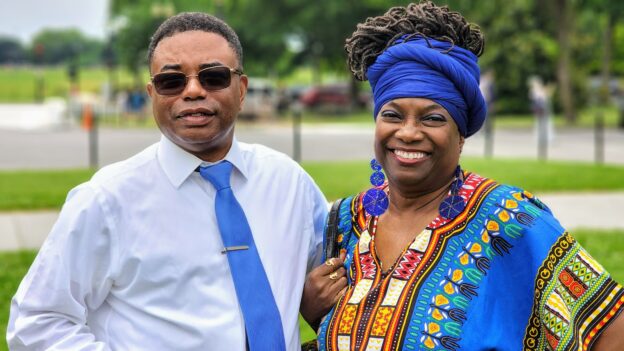

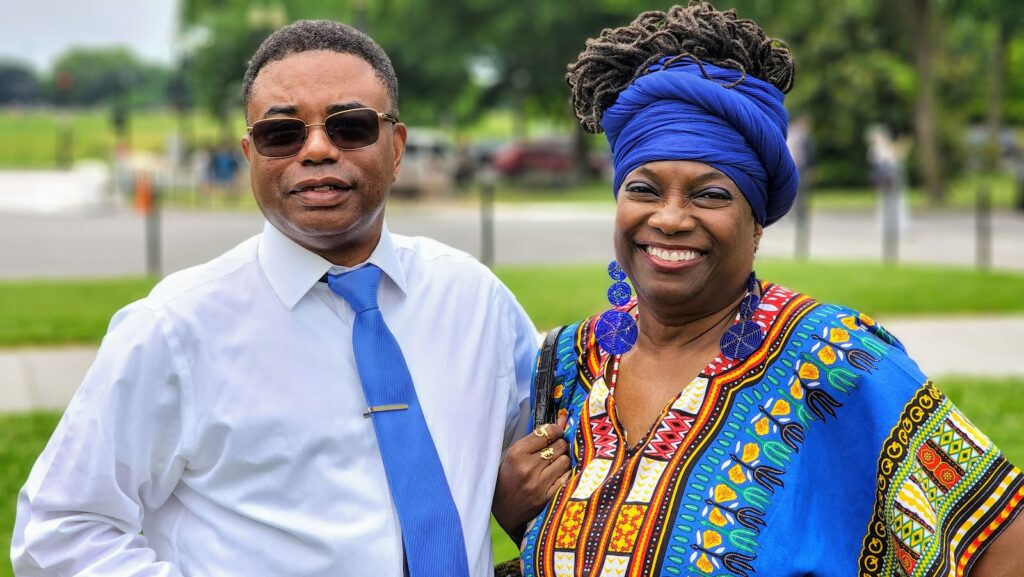
Jarrett Smith, NETWORK Government Relations Advocate, is pictured at a June 16 reparations event near the White House alongside Nkechi Taifa.
Last year, the U.S. government honored Juneteenth as a federal holiday. This recognition came 155 years after the first celebration marked the anniversary of formerly enslaved people and families learning of their liberation in Texas. While the majority of Congress voted in favor of commemorating this day, more is required to fully incorporate the formally enslaved into the American project following the passage of the Civil Rights Act of 1866. Our national will to act and repair must not end there.
It is time to create a system that protects Black people by putting an end to economic and employment inequality, a failing healthcare system, housing segregation, and state-sanctioned police violence. The passage of H.R. 40, a bill first proposed by Rep. John Conyers in 1989, could put the nation on solid footing toward such a process. The bill would create a commission to research and quantify the persistent economic disparities that Black people continue to suffer due to slavery and the discriminatory federal laws and regulatory practices that followed in its wake, and develop reparations proposals for African Americans.
The passage of H.R. 40 would be the first accounting of the role of the federal government and U.S. institutions in the atrocity of slavery, the legalized discrimination that followed, and action needed for atonement. Despite widespread and growing support to reckon with the legacy of systemic racism, H.R. 40 has not been brought to the House floor for a vote.
This reality calls to mind how much who we elect matters. It’s also why NETWORK Lobby calls on President Biden, as a Catholic Christian and U.S. president committed to justice, to sign an executive order to enact H.R. 40 now. It is a moral imperative.
There are precedents for federal-level repair. The federal government has examined and honored claims for reparation from other communities in the past — in 1946 to federally recognized Native American tribes, and in 1981 for Japanese Americans interned during World War II.
Federal financial support to residents following a natural disaster is an example of reparations. This action happens every year. FEMA is the government’s reparations arbitrator. Repair was made because of a harm suffered. As people of all races and backgrounds grapple with the question of what our country’s history means for us, people of faith have shown up repeatedly to drive this point home. Last year, over 200 faith organizations and leaders, including the African American Ministers in Action, the American Muslim Empowerment Network, the Leadership Conference of Women Religious, and the Union for Reform Judaism, signed a letter to House leadership asking for legislation to study redress. In May 2022, dozens of secular and faith-based organizations and racial justice advocates sent a letter to the White House urging President Biden to sign an executive order that would create a federal commission by June 19.
Supporting such proposals should be second-nature to Catholics, whose faith believes in reparatory justice in pursuit of reconciliation. We saw this lived out boldly with Pope Francis’ visit to Canada in late July, in which he met with Indigenous people and apologized repeatedly for the Catholic Church’s role in the residential school system.
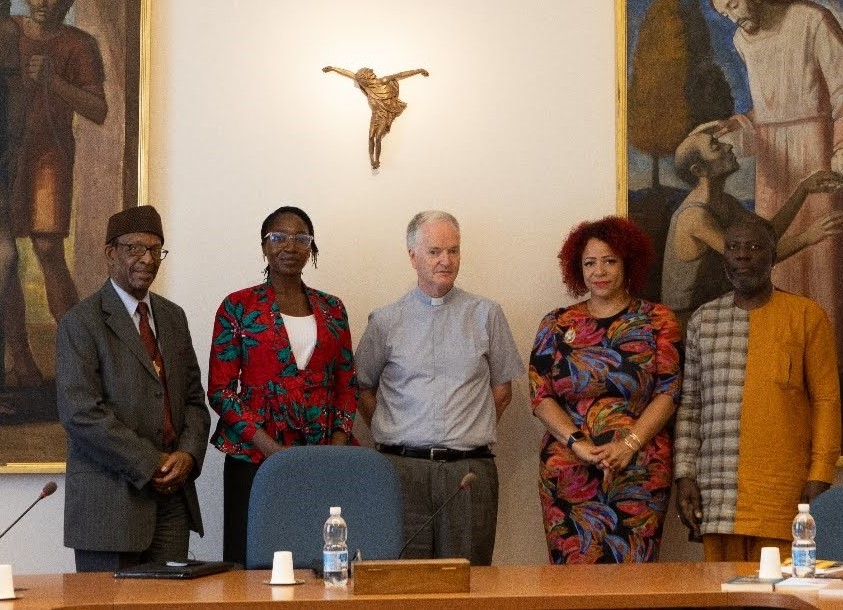
Dr. Ron Daniels, Amara Enyia, Bishop Paul Tighe, Nikole Hanna-Jones, and Kamm Howard meet at the Vatican’s Dicastery for Culture and Education on July 18 to share ideas regarding reparations for Black people in the U.S.
That same month, a delegation from the Global Circle for Reparations and Healing met in Rome with Bishop Paul Tighe, an official of the Dicastery for Culture and Education. A leader in the Vatican’s efforts to grapple with emerging issues, including social media and artificial intelligence, Bishop Tighe suggested the time is “ripe” for the church to consider these issues and agreed to share the delegation’s findings with others.
In his “I Have a Dream” speech, Rev. Dr. Martin Luther King Jr. noted that America had given Black people a bad check “which has come back marked ‘insufficient funds.’ But we refuse to believe that the bank of justice is bankrupt.” Wide support from faith-based and secular organizations today demonstrates the conviction of people in the U.S. that our country must address its original sin of slavery.
People of faith are called to carry on the legacy of working for civil rights and to use their collective power to call on leaders in Congress and the Biden administration to make good on their pledge to tackle systemic racism. Bypassing the opportunity to understand, analyze, and financially quantify this devastation would be more than a missed opportunity; it would be a moral failure.
